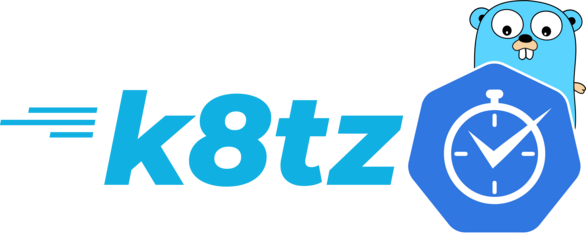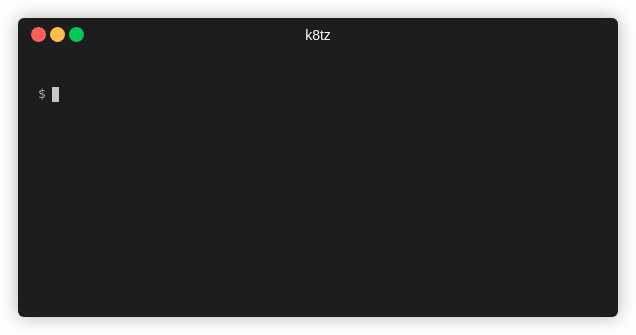k8tz is a kubernetes admission controller and a CLI tool to inject timezones into Pods and CronJobs1.
Containers do not inherit timezones from host machines and have only accessed to the clock from the kernel. The default timezone for most images is UTC, yet it is not guaranteed and may be different from container to container. With k8tz it is easy to standardize selected timezone across pods and namespaces automatically with minimal effort.
Read article: Timezone in Kubernetes With k8tz
tl;dr:
helm repo add k8tz https://k8tz.github.io/k8tz/
helm install k8tz k8tz/k8tz --set timezone=Europe/London- Helm 2 or later
- Kubernetes 1.16+ or OpenShift 4.X
- Permissions to use
emptyDirorhostPath
First, you need to add k8tz helm repository:
helm repo add k8tz https://k8tz.github.io/k8tz/Then, you can install k8tz admission controller:
helm install k8tz k8tz/k8tzIf you want to set some values to configure k8tz, you can use --set, e.g:
helm install k8tz k8tz/k8tz \
--set timezone=Europe/Amsterdam \
--set injectionStrategy=hostPathOptional: You can use helm to test that installation was successful and the admission controller is running using:
helm test k8tz| Parameter | Description | Default |
|---|---|---|
| replicaCount | Amount of admission controller webhooks to spin up. For production use it is recommended to have at least 3 replicas | 1 |
| namespace | The namespace where to install the admission controller | k8tz |
| timezone | The default timezone to inject | UTC |
| injectionStrategy | The default injection strategy to use | initContainer |
| injectAll | If true, timezone will be injected to the pod even when there is no annotation with explicit injection request. When false, the k8tz.io/inject: true annotation is required |
true |
| cronJobTimeZone | Enable injection of timeZone field to CronJobs1 |
false |
| image.repository | The image repository for the admission controller and bootstrap image | quay.io/k8tz/k8tz |
| image.pullPolicy | Admission controller image pull policy | IfNotPresent |
| image.tag | The image tag for the admission controller and bootstrap image. The default is the chart appVersion | - |
| imagePullSecrets | The image pull secrets for the admission controller | [] |
| nameOverride | Helm application name override | - |
| fullnameOverride | Helm application full name override | - |
| serviceAccount.annotations | Annotations to add to the admission controller service account | {} |
| serviceAccount.name | The name of the service account to use. If empty, a name is generated using the fullname template | - |
| podAnnotations | Annotations to add to the admission controller pod | {} |
| podSecurityContext | Pod security context for the admission controller pod | {} |
| securityContext | Security context for the admission controller pod | {} |
| service.type | Admission controller service type | ClusterIP |
| service.port | Admission controller service port | 443 |
| resources | Resource requests and limitations for the admission controller deployment | {} |
| nodeSelector | Node selector for the admission controller deployment | {} |
| tolerations | Tolerations for the admission controller deployment | {} |
| affinity | Affinities and anti-affinities for the admission controller deployment | {} |
| webhook.failurePolicy | Failure policy for the admission webhook. May be Fail or Ignore |
Fail |
| webhook.crtPEM | Certificate in PEM format for the admission controller webhook. Will be generated if not specified (Recommended) | - |
| webhook.keyPEM | Private key for in PEM format for the admission controller webhook certificate. Will be generated if not specified (Recommended) | - |
| webhook.caBundle | Certificate Authority Bundle for the admission controller webhook. Will be generated if not specified (Recommended) | - |
To uninstall k8tz with Helm use:
helm delete k8tzk8tz can be used as a command-line tool to inject timezone into yaml files or to be integrated inside another deployment script that don't want to use the admission controller automation.
You can process the test-pod.yaml from file-to-file or directly to kubectl:
# to a file
k8tz inject --strategy=hostPath test-pod.yaml > injected-test-pod.yaml
# or directly to kubectl
k8tz inject --timezone=Europe/London test-pod.yaml | kubectl apply -f -Or you can inject to all existing deployments in current namespace:
kubectl get deploy -oyaml | k8tz inject - | kubectl apply -f -NOTE: The injection process is idempotent; you can do it multiple times and/or use the CLI injection alongside the admission controller. Subsequent injections have no effect.
You can install k8tz binary file by downloading precompiled binary and use it
wget -c https://github.com/k8tz/k8tz/releases/download/v0.4.0/k8tz_0.4.0_linux_amd64.tar.gz -O - | tar xz
chmod +x k8tz
./k8tz versionthen install it to your $PATH with:
sudo install k8tz /usr/local/bin/k8tzIf you have go installed, you can install k8tz with:
go install github.com/k8tz/k8tz@latestYou can use k8tz directly from Docker, here are some examples:
docker run -i quay.io/k8tz/k8tz --help
cat test-pod.yaml | docker run -i quay.io/k8tz/k8tz inject -tPortugal - | kubectl create -f
kubectl get deploy -oyaml | docker run -i quay.io/k8tz/k8tz inject - | kubectl apply -fYou can build k8tz binary from source yourself by simple running:
make compileThe created binary will be located at build/k8tz, you can then install it to your PATH using:
make TARGET=/usr/local/bin installTo uninstall, use sudo rm -v /usr/local/bin/k8tz.
Timezone information is defined using Time Zone Information Format files (TZif, RFC-8536). The Timezone Database contains TZif files that represent the local time for many locations around the globe. To set the container's timezone, /etc/localtime inside the container should point to a valid TZif file which represents the requested timezone. In most images these files do not exist by default, so we need to make them available from inside the container mounted at /etc/localtime.
Currently, there are 2 strategies how it can be done:
If those files (which are located under /usr/share/zoneinfo) exist in every node on the cluster (it is the user's responsibility to ensure that), hostPath volume can be used to supply the required TZif file into the pod. If the required timezone will be missing on the host machine, the pod will be stuck in PodInitializing status and will not be started.
Another solution, which is generally safer, is to inject initContainer (bootstrap image) to the pod and supply the required TZif file using a shared emptyDir volume. This is the default method of k8tz.
The behaviour of the controller can be changed using annotations on both Pod and/or Namespace objects. If the same annotation specified in both, the Pod's annotation value will take place.
| Annotation | Description | Default |
|---|---|---|
k8tz.io/inject |
Decide whether k8tz should inject timezone or not | true |
k8tz.io/timezone |
Decide what timezone should be used, e.g: Africa/Addis_Ababa |
UTC |
k8tz.io/strategy |
Decide what injection strategy to use, i.e: hostPath/initContainer |
initContainer |
- Support
StatefulSetinjection - Lookup for annotations in pods owner when possible
- Test and document installation on OpenShift
- Implement
make installfor easier installation from source - Add VERBOSE flag to helm
- Write verbose logs for webhook
- Fix documentation about
uclibc
k8tz has been tested widely with many popular base images and worked perfectly with alpine, amazonlinux, busybox (glibc, musl), centos, clearlinux, debian, fedora, photon, ros, ubuntu and many more.
The only limitation found so far is that uclibc not respecting TZif files in /etc/localtime. Images as busybox built with uclibc will not be affected by k8tz.
Footnotes
-
Timezones for CronJobs are available only from kubernetes >=1.24.0-beta.0 with
CronJobTimeZonefeature gate enabled. ↩ ↩2






